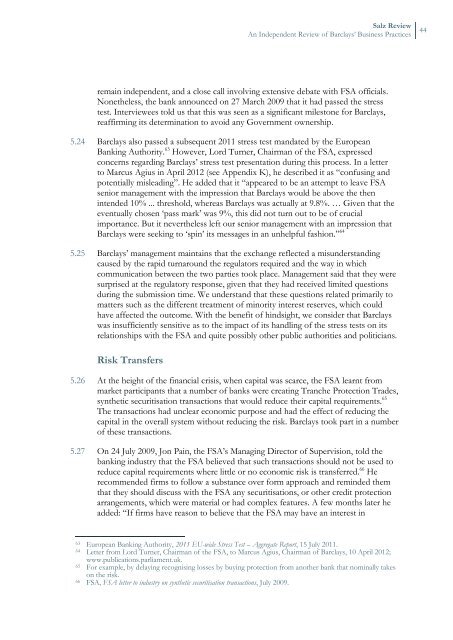Salz Review - Wall Street Journal
Salz Review - Wall Street Journal
Salz Review - Wall Street Journal
Create successful ePaper yourself
Turn your PDF publications into a flip-book with our unique Google optimized e-Paper software.
<strong>Salz</strong> <strong>Review</strong><br />
An Independent <strong>Review</strong> of Barclays’ Business Practices<br />
44<br />
remain independent, and a close call involving extensive debate with FSA officials.<br />
Nonetheless, the bank announced on 27 March 2009 that it had passed the stress<br />
test. Interviewees told us that this was seen as a significant milestone for Barclays,<br />
reaffirming its determination to avoid any Government ownership.<br />
5.24 Barclays also passed a subsequent 2011 stress test mandated by the European<br />
Banking Authority. 63 However, Lord Turner, Chairman of the FSA, expressed<br />
concerns regarding Barclays’ stress test presentation during this process. In a letter<br />
to Marcus Agius in April 2012 (see Appendix K), he described it as “confusing and<br />
potentially misleading”. He added that it “appeared to be an attempt to leave FSA<br />
senior management with the impression that Barclays would be above the then<br />
intended 10% ... threshold, whereas Barclays was actually at 9.8%. … Given that the<br />
eventually chosen ‘pass mark’ was 9%, this did not turn out to be of crucial<br />
importance. But it nevertheless left our senior management with an impression that<br />
Barclays were seeking to ‘spin’ its messages in an unhelpful fashion.” 64<br />
5.25 Barclays’ management maintains that the exchange reflected a misunderstanding<br />
caused by the rapid turnaround the regulators required and the way in which<br />
communication between the two parties took place. Management said that they were<br />
surprised at the regulatory response, given that they had received limited questions<br />
during the submission time. We understand that these questions related primarily to<br />
matters such as the different treatment of minority interest reserves, which could<br />
have affected the outcome. With the benefit of hindsight, we consider that Barclays<br />
was insufficiently sensitive as to the impact of its handling of the stress tests on its<br />
relationships with the FSA and quite possibly other public authorities and politicians.<br />
Risk Transfers<br />
5.26 At the height of the financial crisis, when capital was scarce, the FSA learnt from<br />
market participants that a number of banks were creating Tranche Protection Trades,<br />
synthetic securitisation transactions that would reduce their capital requirements. 65<br />
The transactions had unclear economic purpose and had the effect of reducing the<br />
capital in the overall system without reducing the risk. Barclays took part in a number<br />
of these transactions.<br />
5.27 On 24 July 2009, Jon Pain, the FSA’s Managing Director of Supervision, told the<br />
banking industry that the FSA believed that such transactions should not be used to<br />
reduce capital requirements where little or no economic risk is transferred. 66 He<br />
recommended firms to follow a substance over form approach and reminded them<br />
that they should discuss with the FSA any securitisations, or other credit protection<br />
arrangements, which were material or had complex features. A few months later he<br />
added: “If firms have reason to believe that the FSA may have an interest in<br />
63 European Banking Authority, 2011 EU-wide Stress Test – Aggregate Report, 15 July 2011.<br />
64 Letter from Lord Turner, Chairman of the FSA, to Marcus Agius, Chairman of Barclays, 10 April 2012;<br />
www.publications.parliament.uk.<br />
65 For example, by delaying recognising losses by buying protection from another bank that nominally takes<br />
on the risk.<br />
66 FSA, FSA letter to industry on synthetic securitisation transactions, July 2009.
















